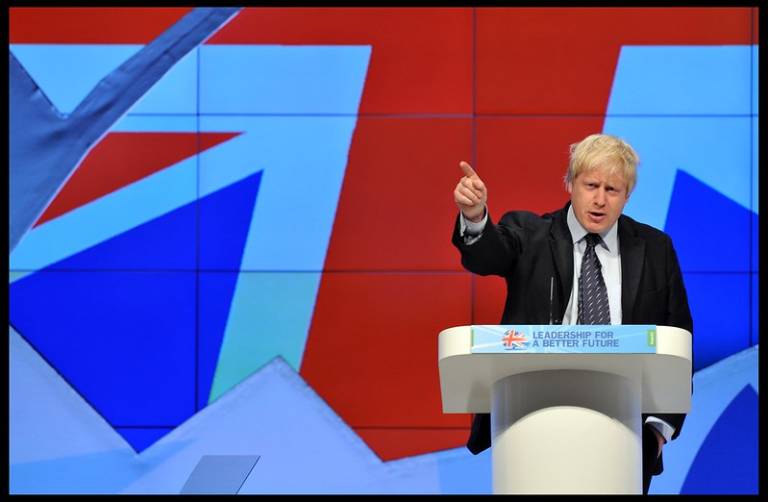Opinion: Keeping them (equally) honest? Part two
19 July 2019
Oliver Patel argues that the Tory Party leadership campaign highlights the need to shine a spotlight on inequality in UK society.

Oliver Patel, Research Assistant - UCL Grand Challenges
The second article in a series assessing the Tory leadership campaign from the perspective of inequality. Part one can be read here.
The rise of populism -- expressed in the votes for Brexit and Trump -- and the rise of the far-right across Europe and beyond, are complex political phenomena with multiple causes. However, the social and economic impacts of the 2008 financial crisis, and the policies implemented by governments in response, offer some explanation. In the UK, the post-crash political economy has resulted in increased levels of inequality and decreased social cohesion. Austerity policies, such as cuts to welfare and education budgets, have exacerbated inequalities and disproportionately impacted lower-income and minority groups. Furthermore, little has been done to rebalance the economy or address stark geographical inequalities across the UK.
On 22 July, the winner of the Tory leadership election will be declared. Shortly after, the successful candidate will become Prime Minister. Brexit has dominated the campaign, with little space for discussion of other issues. The overwhelming focus of debate has been on delivering Brexit: when and how to leave the EU, and whether or not to leave on 31 October irrespective of whether a deal has been agreed. (A cynic might even suggest that these debates have occurred in the context of what is better for the electability of the Conservative Party.) Although the mechanics of Brexit are important, an extraterrestrial observer of the campaign would mistakenly believe that the UK faces no other pressing issues.
The leadership campaign has offered little evidence that either candidate will prioritise social justice and policies aimed at reducing inequalities, with such issues barely mentioned in the hustings and TV debates. Given the background of both frontrunners, and the nature of the electorate which they are attempting to win over (i.e. Conservative Party members), this is perhaps unsurprising. Nonetheless, it is important to assess the inequality credentials of both Hunt and Johnson.
Jeremy Hunt
Hunt has focused on young people, intergenerational justice and education throughout his campaign. He has argued that we need to ‘unite the generations’ by making it much easier for young people to buy homes. He has also pledged to spend more on education and to end post-primary school illiteracy, calling it the UK’s ‘national blind spot’. These objectives would address core drivers of inequality, but they have not been accompanied with detailed policy proposals. Hunt’s main domestic focus is on ‘turbo-charging’ the economy, and creating the next Silicon Valley in the UK. Even if he succeeded, this would not necessarily address socioeconomic inequalities, as the experience of San Francisco highlights.
As Foreign Secretary and former Health Secretary, it is unsurprising that Hunt has voted with the government over the past decade, and has been in favour of welfare cuts and cuts to local authority funding. His views on abortion stand out: he believes that the abortion limit should be cut from 24 to 12 weeks, but has ruled out changing the law if Prime Minister. Furthermore, despite being the UK’s longest serving health secretary (2012-2018), health inequalities such as the difference in life expectancy between the richest and poorest have increased in this time under Hunt. In addition, there has also been an unprecedented fall in life expectancy for some low-income population groups during this period. Finally, Hunt has taken little action to implement the Marmot Review’s recommendations on addressing the social determinants of health.
Boris Johnson
Boris Johnson is notorious for flipping on areas of public policy. He has argued that ‘no town, community or person should feel left behind’, and has advocated for improving transport infrastructure and rail connectivity in the North and Midlands, as well as strengthening broadband coverage, calling it a ‘travesty’ that so few people have access to fibre optic broadband speeds. He has also advocated increasing funding for further education colleges, and has pledged to spend more on public services in general than the current government.
However, throughout his career Johnson has regularly made racist, sexist and homophobic comments. These include referring to Muslim women in burkas as ‘letterboxes’, calling gay men ‘bumboys’, and referencing Barack Obama’s ‘part Kenyan’ ancestry. On these comments alone, it is doubtful that Johnson will become a champion of equality and social justice as Prime Minister. Furthermore, Johnson is an enthusiastic supporter of a no deal Brexit, which would inevitably increase inequality in UK society and make life harder for the worst off.
Regardless of who wins the Tory leadership election, it does not appear likely that either candidate will put inequality at the heart of their premiership. Analysis of the campaign debates, the candidates’ programmes and their political record indicates that Brexit will dominate the political landscape. Although there is plenty of groundbreaking work being done across society to tackle these issues, without political will, meaningful and substantive change will be difficult to achieve.
Perhaps a lack of focus on inequality in the leadership campaign was inevitable. However, healing the fractures in UK society requires more than just figuring out the mechanics of Brexit. We must demand a renewed focus on issues relating to inequality from the new Prime Minister - and we should not accept warm words as sufficient. As Theresa May showed, it is easy to get side-tracked in the job. Despite positive rhetoric at the start of her premiership when she vowed to ‘tackle the burning injustices’ in UK society, her record on inequality is underwhelming. Radical vision and fundamental reform is needed, and words need to be backed up with action.
Image credit: Andrew Parsons - Flickr (CC BY-ND 2.0)
> More on Exploring Inequalities
 Close
Close

